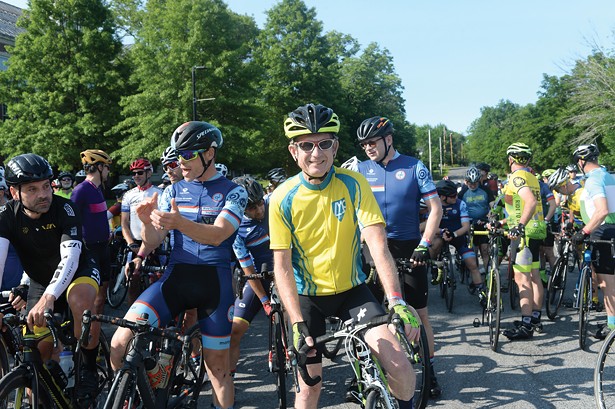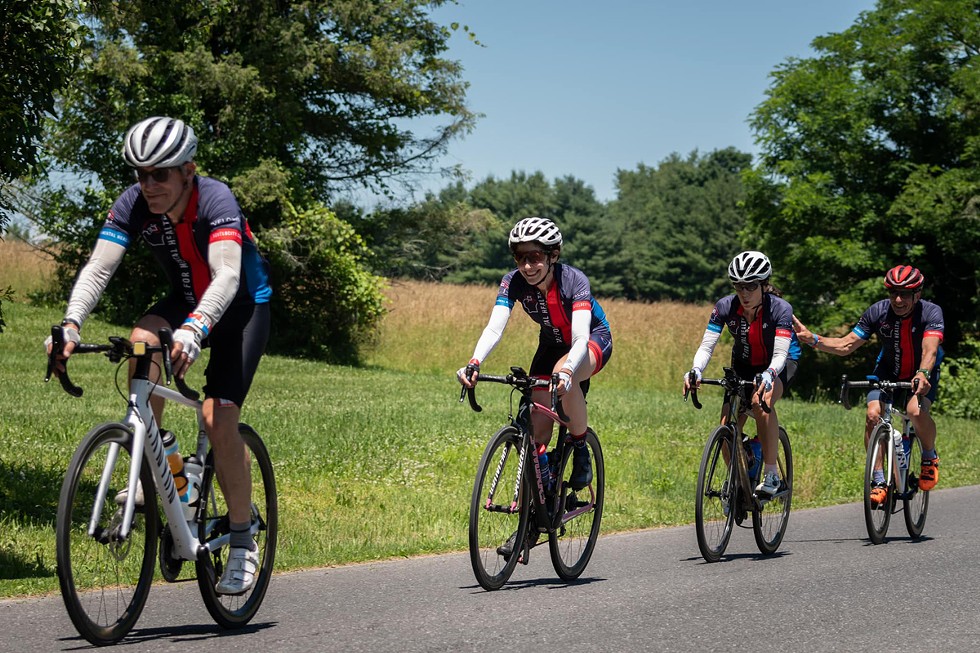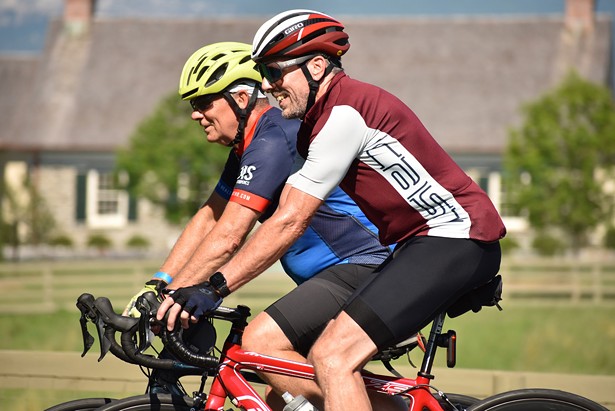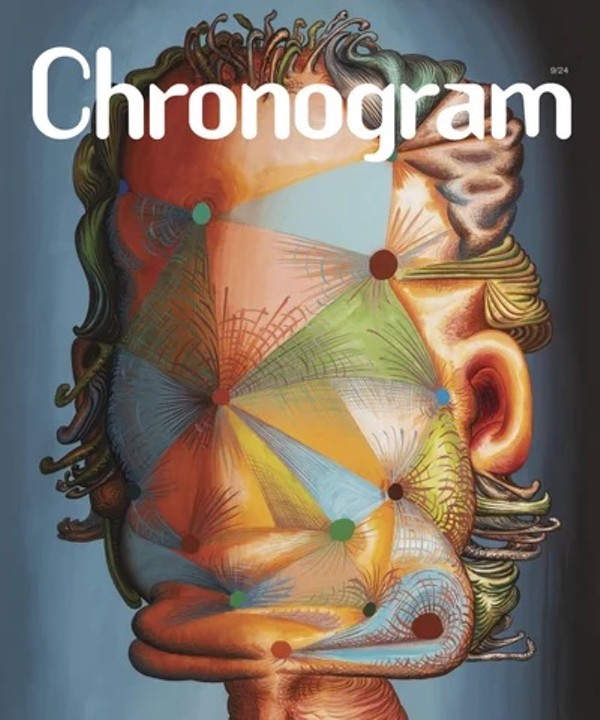Mac Dorris has been an avid cyclist for about 50 years, and when his 21-year-old son, Eric, died of an accidental overdose in 2016, Mac used cycling to help deal with the loss. "When Eric died, the grief was insane," Mac says. Mac found group rides with friends to be a helpful distraction, but he also found comfort on solo rides where he'd go out on a beautiful road and think about memories of Eric.
At the time of his death, Eric was being treated as an outpatient at McLean Hospital in Belmont, Massachusetts, outside of Boston, for borderline personality disorder, substance use issues, and other mental health conditions. McLean is the psychiatric teaching hospital of Harvard Medical School and is ranked the number one hospital in America for psychiatric care by US News & World Report.
According to a 2022 survey conducted by the Kaiser Family Foundation and CNN, one-third of United States adults report that in the past year, they've felt anxious "always or often." The survey also found that one-third of US adults don't have access to the mental health services that they need, and a whopping 90 percent think our country is experiencing a mental health crisis. For many people, cost is the barrier and 74 percent say insurance doesn't cover mental health the way it does physical health. On top of insurance falling short, there are other barriers to mental health care. Fifty-five percent say that lack of providers is an issue, 62 percent say that shame and stigma get in the way of care, and 39 percent cite lack of diversity as some of the top reasons that impede mental health care access.

Mac and his wife, Ginny, Eric's mom, had already started a fund at McLean, but about a year after Eric's death, Mac realized he wanted to do something additional to honor his middle son. "I was basically reaching retirement from my legal career and trying to figure out what to do with the rest of my life," Mac says, so he started researching charity bike rides that raise funds for mental health. "I found almost zero, which was really striking to me."
Mac and his family lived full-time in Brooklyn when he worked in the city, but they've owned a home in New Paltz since 1990, and Ulster County seemed like a great spot to base the Ride for Mental Health, a non-profit that raises money for the education, research, and treatment of mental illness at McLean Hospital. "New Paltz is a great area to ride," Mac says. The community is progressive, and I knew they'd support the event and have no problem attacking the stigma of mental illness head-on."
Despite the community's support, Mac says organizing a charity bike ride was daunting, but his background as a finance lawyer turned out to be helpful. "When you do big financing, you have 200 pieces of paper that you have to put all together, figure out how they all work, and get everybody to agree on everything," Mac says. "Organizing a charity bike ride is kind of the same thing."
Mac learned how to organize the ride by talking to other charity bike ride organizers, and, like a good lawyer, he did his due diligence. One of the most important things Mac learned—when his brother was already out on the course putting up one sign for every turn—is that you need three signs for every turn. "You've gotta have one before the turn, one at the turn and then one after the turn to let people know they did the right thing," Mac says. On long straightaways, they put up signs every mile, so people don't have to wonder if they got lost.
The Ride for Mental Health doesn't spray paint the roads, permanently alter the route, or leave any trace, and, as a result, the main floor of Mac and Ginny's barn is filled with hundreds of ride signs. "They're organized by left turns, right turns, straight signs, the half left, the half rights, the rest stop signs, and the rest-up-ahead signs," Mac says. It takes an entire day and several teams of volunteers to put up all the signs, partly because the ride has various options for different skill and motivation levels.
A Volunteer Effort
The Ride for Mental Health includes a 25-mile ride, two 50-mile rides (a north loop and a south loop), and a 100-mile ride, which is both 50-mile rides put together. Riders who want to complete the 100-mile ride in a single day must do so on Saturday, but Mac says some riders complete the century ride by doing 50 miles on Saturday and 50 miles on Sunday. In addition, there's a 14-mile rail trail option for younger riders, families, and those who don't want to deal with cars.The Ride grew from 100 riders in 2017, its inaugural year, to over 400 in 2023. This year's event takes place on June 22-23. Last year, the Ride had over 50 sponsors and 1,600 donors to help pay for event expenses not covered by registration fees. Mac knows the Ride is still on the small side, but he hopes it will continue to grow and he treats it like a world-class event, which requires at least 150 volunteers.
Eric's mother, Ginny, is instrumental in organizing volunteers, and she recruits a big group of friends and family to help throughout the weekend. Eric's older brother, Greg, usually rides on Saturdays and volunteers on Sundays. Eric's younger brother, Peter, volunteers all weekend doing whatever is needed, including loading refreshments into volunteers' cars so they can be delivered to aid stations and the finish line.
Sharing and Connecting
"The event is about creating a community that is shining a spotlight on mental health and helping to erase the stigma associated with mental illness," Mac says, noting that the pandemic and other societal factors, such as the increase in social media, have spurred a rise in anxiety and other mental health conditions, and young people are the most vulnerable.One of Mac's favorite things about the Ride—beyond honoring Eric and raising funds for McLean Hospital—is the way the Ride brings people together. People come from all over to recognize their friends and family who have struggled with mental illness, and the Ride gives people the opportunity to share their stories with others. Mac says a group comes every year from Buffalo to ride with the sister of a man who suffered from depression and committed suicide in his fifties. Mac's cyclist friends from Brooklyn come up. "One friend lost his sister to suicide when she was young," Mac says, "And another lost his brother. They had no idea that he was suffering from depression." Whether riding or volunteering, Mac says people tell stories all weekend, and the sharing and connecting is healing.
Unlike many charity events, the Ride takes place over two days, and on Saturday night, there's a hosted dinner for all riders and volunteers. The dinner includes a cocktail hour with live music followed by a buffet dinner, which is an essential component of the ride, as it provides all participants—cyclists and volunteers—with time to relax, hang out, and tell more stories.
The Ride for Mental Health started in 2017 and has raised over $1.2 million since inception. The bulk of the funds has been donated to McLean Hospital, but the Ride has also donated $15,000 to the New Paltz Youth Program and $15,000 to the Maya Gold Foundation, which was created by Elise Gold and Mathew Swerdloff, parents of Maya Gold, a New Paltz High School student who took her own life in October of 2015 at age 15. The Maya Gold Foundation's mission is "to empower youth to access their inner wisdom and realize their dreams."
The Ride for Mental Health takes place in June, but because May is Mental Health Awareness Month, it's a great time to sign up and get some training rides in, especially if you plan to do one of the longer rides. It's also a great time to commit to volunteer. Sign up to ride or volunteer at Rideformentalhealth.org.
Immersive Account
Mental Health Awareness Month has been observed in the United States since 1949, often with film screenings and other media events, and on Saturday, May 4, there will be a screening of Charm Circle at the Beacon Theatre at 445 Main Street in Beacon. Charm Circle is a documentary by Nira Burstein that offers an intimate, immersive account of the filmmaker's family's emotional, financial, and social struggles as they navigate a family crisis while also moving from their longtime home. This screening is produced by Shane Killoran, CEO of Hit House Creative, and Dr. Hannah Brooks, founder of Beacon LitFest.Following the film, there will be a moderated discussion with Steve Miccio, CEO of People USA and Andrew O'Grady, CEO of Mental Health America of Dutchess County. "We wanted to support these filmmakers in trying to destigmatize mental illness, to deepen our community's understanding and open up real dialogue around the issues," Brooks says. "We also want to shed light on the organizations in our area doing the heavy lifting in providing support to affected individuals."



















